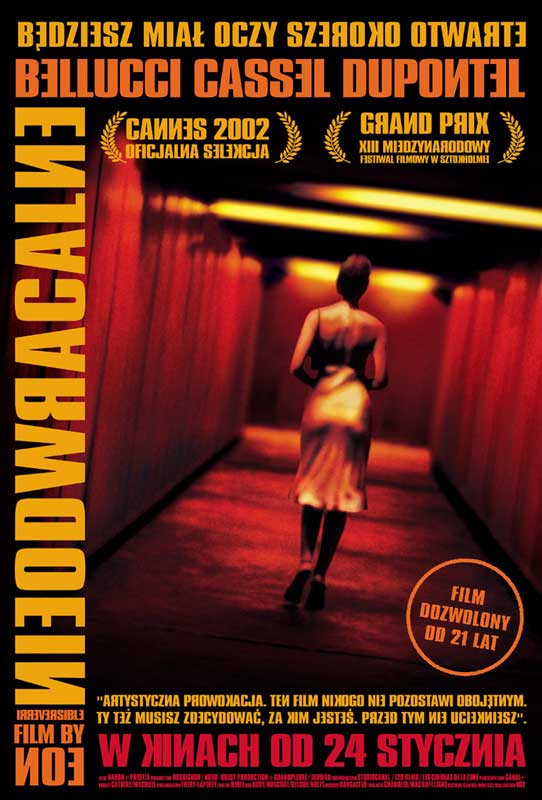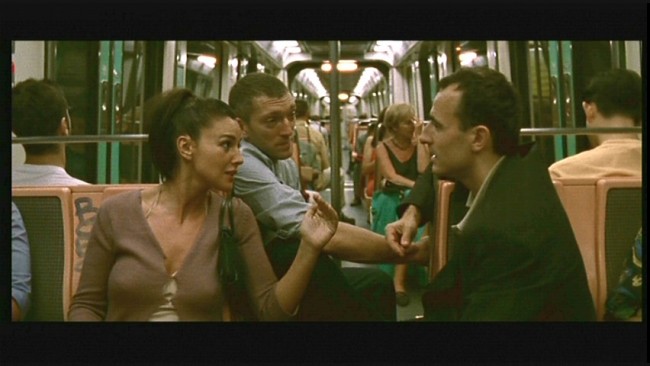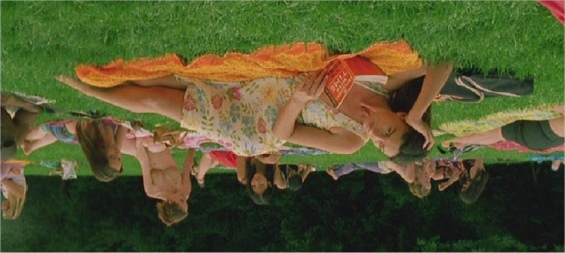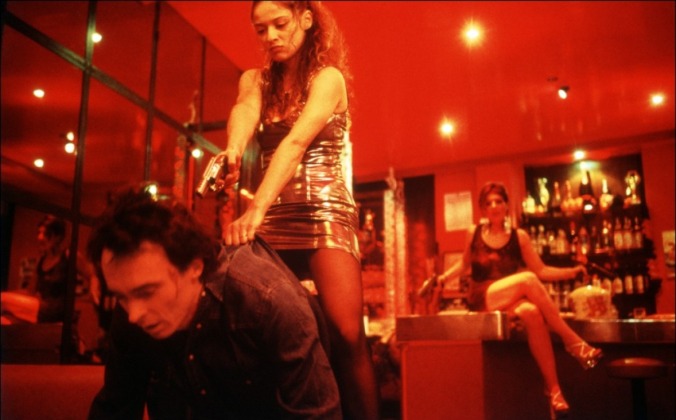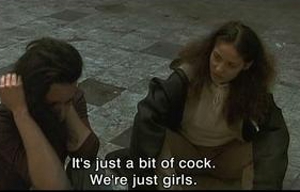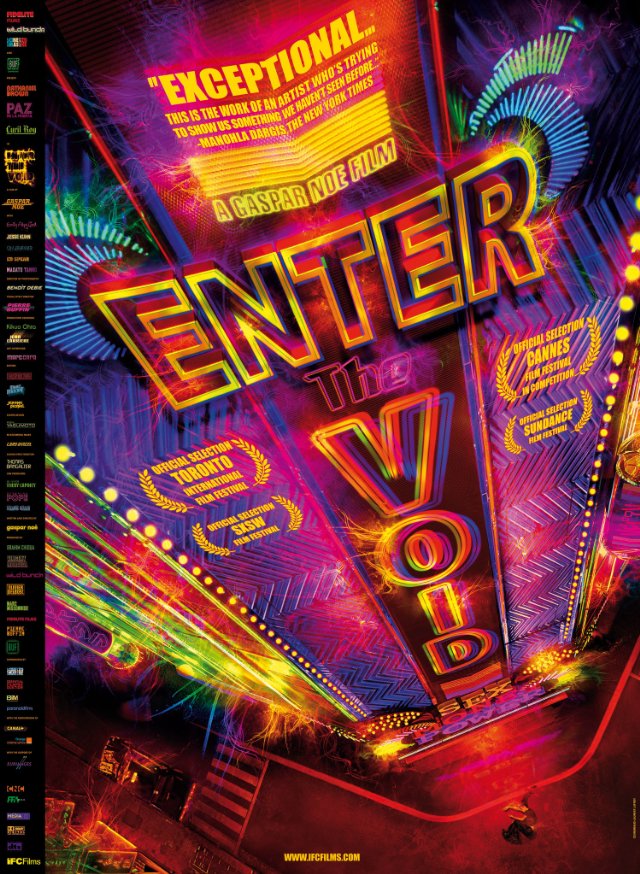5 STARS
“Irréversible”
General Information:
All information below is taken from the following link: http://www.imdb.com/title/tt0290673/?ref_=fn_al_tt_1
18 97 min – Crime | Drama | Mystery – 31 January 2003(UK)
Director
Writer
Stars
Monica Bellucci; Vincent Cassel; Albert Dupontel
Plot:
Events of one night unfold in reverse-chronological order, opening with events after a tragic rape, and then progressing backwards and backwards before the brutal act occurred.
Review:
I felt physically sick whilst watching Irreversible. But I mean this as the highest compliment possible. It is my belief that if you dislike this film because it is sick then you are entirely missing the point. Rape and violence on screen should hurt the viewer, if not, the filmmaker is in a somewhat ‘dodgy’ moral-position. I confess, I felt a vile churning feeling in my stomach throughout and at some points, I closed my eyes; furthermore, I felt that horrific feeling of actually wanting to be physically sick, but being unable to. This is the most extreme reaction I’ve ever had to a film.
The ‘unwatchability-factor’ of the film is highly connected to its blunt, if not obvious message: rape and violence are barbaric acts and fate is inescapable.
The film is infamous for an 8-minute rape scene, where the camera stays icily still and forces the viewer to watch. It is often the case that rape or violence is portrayed in film via cheap gimmicks, no doubt used due to the ludicrousness of censorship-culture: the camera turns away and you hear a scream. Well, I’m sorry, but in real life, that’s not what happens when someone is brutally assaulted. The victim experiences the entire barbaric act, and it is morally-right that the act isn’t cheapened or made to be less horrific. Gaspar Noe understands this and thus makes the viewer witness the entire thing, thereby showing what rape really is. This pleases me because there seems to be a lot of ‘rape culture’ infesting its way through our world: people discussing the act as if it’s a joke or a game. Show such people Irreversible, they won’t be laughing anymore. I don’t wish to degrade the act of rape to something less barbaric or fun, but the only way I can describe the scene simply is that it is “the cinematic equivalent of being sexually assaulted”. That is genuinely how I felt. It is one of the most brutal and powerful scenes I have frankly, ever seen in any film. The scene almost (heavy stress on almost) makes the viewer feel like the victim, Alex (Monica Bellucci), that they see on screen, as the scene is: unforgiving, uncompromising, brutal, and it feels longer than it actually is, and you will (horrifically) always remember it.
It is of course a shame that this is all the film is famous for. The film isn’t strictly about rape, or even violence for that matter. (This is 8 minutes in a film that lasts for 97 minutes.) The film is about the inevitability of fate. The narrative of the film goes backwards. Thus, the point being, that we ironically know what is going to happen to Alex before she does. As the film draws to a close, it ends on her beginning the day, we now know everything that will happen to her, whilst she is blissfully unaware. The infamous 8-minute scene plays halfway through the film. Following this are thirty minutes of laughter, contentedness (and perhaps even, tranquility). It is endless shots of Alex, her boyfriend and her friends smiling, drinking and having fun. Personally, I found these scenes more disturbing than the rape itself – what is more disturbing: the concept of rape, or not knowing in the future that you will be sexually-assaulted, and that it is an inevitable event in your life’s own timeline? Those brutal 8-minutes or more will always happen to Alex and she will never be able to escape them, they are a fixed point in time. Thus, the film transcends cheap exploitation into a film about predetermination and a very bleak form of existentialism. Think of it as a very brutal Art-film.
Stylistically, the film is fantastic. Gaspar Noe is the most inventive director around when it comes to sound-design and cinematography. His camera spins and glides in a dizzying fashion through each scene, quite literally spinning endlessly around characters. You feel physically repulsed by the cinematography as the constant spinning builds up a sense of giddying, dizzying, vomit-inducing dread. The sound design is a consistent drone which adds to the visuals, but furthermore, it contains a specific-note which when played constantly apparently taps into a part of your psyche which produces that feeling of being physically sick. The film understands that depth and style must be combined together to make a truth. The concept of fate is thus interlinked with the feeling of sickness and revulsion, to make the audience contemplate the negative concepts and ideas that eschew from fate and predetermination.
This is a provocative film which is at once very intense psychologically and very intense intellectually due to the philosophical notions that it puts forwards. It deserves to be commended in the highest regards.
Conclusion:
Perhaps one of the most disturbing films I’ve ever seen. But also one of the most profound. Indeed, the depth adds to the disturb as it makes the terrifying sequences and concepts of the film stay with you. Irreversible is truly cinematic. Indeed, this is the kind of film which going to the cinema is all about.
